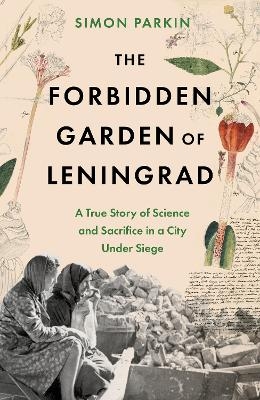
The Forbidden Garden of Leningrad
A True Story of Science and Sacrifice in a City under Siege
Seiten
2024
Sceptre (Verlag)
978-1-3997-1455-6 (ISBN)
Sceptre (Verlag)
978-1-3997-1455-6 (ISBN)
A gripping untold story of the world's most valuable seed bank, the siege of Leningrad and a terrible choice
From the winner of the 2023 Wingate Literary Prize comes a fascinating and moving untold story of the Leningrad scientists who risked everything for the future of humanity
An astonishing story brilliantly told . . . It is as moving as it is gripping to read
Jonathan Dimbleby, author of Endgame: 1944
'A richly researched and meticulously observed account of a little-explored corner of 20th-century history'
Guardian
'A fantastically well-researched history of science and sacrifice saturated in drama'
i
In the summer of 1941, German troops surrounded the Russian city of Leningrad - now St Petersburg - and began the longest blockade in recorded history. By the most conservative estimates, the siege would claim the lives of three-quarters of a million people. Most died of starvation.
At the centre of the embattled city stood a converted palace that housed the greatest living plant library ever amassed - the world's first seed bank. After attempts to evacuate the collection failed, and as supplies dwindled, the scientists responsible faced a terrible decision: should they distribute the specimens to the starving population, or preserve them in the hope that they held the key to ending global famine?
Drawing on previously unseen sources, The Forbidden Garden tells the remarkable and moving story of the botanists who remained at the Plant Institute during the darkest days of the siege, risking their lives in the name of science.
'A compelling account... A remarkable work of literary exhumation. The first full account of the Plant Institute in any language, it's a fitting testimony to an extraordinary project and the bravery of the ordinary individuals who kept it going'
Telegraph
'A beautifully-written account of one of the most extraordinary and little-known episodes of the Second World War -- a scientific feat and act of collective self-sacrifice the consequences of which continue to be felt today'
Adam Higginbotham, author of Challenger
'A gripping, original and important story of courage and science in wartime'
Roland Philipps, author of A Spy Named Orphan
From the winner of the 2023 Wingate Literary Prize comes a fascinating and moving untold story of the Leningrad scientists who risked everything for the future of humanity
An astonishing story brilliantly told . . . It is as moving as it is gripping to read
Jonathan Dimbleby, author of Endgame: 1944
'A richly researched and meticulously observed account of a little-explored corner of 20th-century history'
Guardian
'A fantastically well-researched history of science and sacrifice saturated in drama'
i
In the summer of 1941, German troops surrounded the Russian city of Leningrad - now St Petersburg - and began the longest blockade in recorded history. By the most conservative estimates, the siege would claim the lives of three-quarters of a million people. Most died of starvation.
At the centre of the embattled city stood a converted palace that housed the greatest living plant library ever amassed - the world's first seed bank. After attempts to evacuate the collection failed, and as supplies dwindled, the scientists responsible faced a terrible decision: should they distribute the specimens to the starving population, or preserve them in the hope that they held the key to ending global famine?
Drawing on previously unseen sources, The Forbidden Garden tells the remarkable and moving story of the botanists who remained at the Plant Institute during the darkest days of the siege, risking their lives in the name of science.
'A compelling account... A remarkable work of literary exhumation. The first full account of the Plant Institute in any language, it's a fitting testimony to an extraordinary project and the bravery of the ordinary individuals who kept it going'
Telegraph
'A beautifully-written account of one of the most extraordinary and little-known episodes of the Second World War -- a scientific feat and act of collective self-sacrifice the consequences of which continue to be felt today'
Adam Higginbotham, author of Challenger
'A gripping, original and important story of courage and science in wartime'
Roland Philipps, author of A Spy Named Orphan
Simon Parkin is an award-winning British writer and journalist. He is a contributing writer for the New Yorker and a fellow of the Royal Historical Society (RHS), and is the author of A Game of Birds and Wolves and The Island of Extraordinary Captives, which was a New Yorker Book of the Year and won the Wingate Literary Prize. He lives in West Sussex.
| Erscheinungsdatum | 20.11.2024 |
|---|---|
| Sprache | englisch |
| Maße | 162 x 238 mm |
| Gewicht | 599 g |
| Themenwelt | Sachbuch/Ratgeber ► Natur / Technik ► Natur / Ökologie |
| Geschichte ► Allgemeine Geschichte ► 1918 bis 1945 | |
| Geschichte ► Teilgebiete der Geschichte ► Militärgeschichte | |
| ISBN-10 | 1-3997-1455-4 / 1399714554 |
| ISBN-13 | 978-1-3997-1455-6 / 9781399714556 |
| Zustand | Neuware |
| Haben Sie eine Frage zum Produkt? |
Mehr entdecken
aus dem Bereich
aus dem Bereich
ein Psychologe erlebt das Konzentrationslager
Buch | Hardcover (2024)
Kösel (Verlag)
22,00 €
Mythos „Stauffenberg-Attentat“ – wie der 20. Juli 1944 verklärt und …
Buch | Hardcover (2024)
Goldmann (Verlag)
24,00 €


